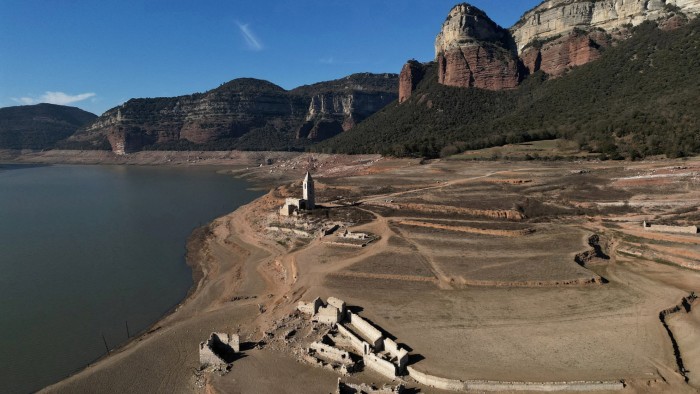Good morning. What links Ursula von der Leyen, Christine Lagarde, Taylor Swift and Charli XCX? All are on this year’s FT list of the 25 most influential women, published today.
Today, the head of the European Environment Agency warns our climate correspondent about the rising links between climate change and migration, and I report on a startling new poll that underscores the depth of Euroscepticism in France.
Have a great weekend.
Fleeing
Migration is a topic never far from European leaders’ minds.
But Europe should start considering the issue also among potential climate risks that put pressure on the continent’s already dwindling water supplies, the head of the European Environment Agency tells Alice Hancock.
Context: Europe may be cooler than other regions in the world, but it is warming at twice the global average because of its location and geography. Extreme weather, ranging from forest fires to floods, has become increasingly common in recent years.
“Several climate risks have already reached critical levels,” said the EEA’s first climate risk assessment of the bloc presented in March this year.
One of the effects that the report did not mention, however, was the potential for increased migration as weather patterns change, and what this will mean for resources already under stress.
EEA executive director Leena Ylä-Mononen said migration was beyond the assessment’s remit at the time, but should be part of the bloc’s future evaluations — particularly as it had been mentioned in a recent report by former Finnish president Sauli Niinistö on EU security and defence.
“It is among these overall risks that we have to take into account when we look beyond the immediate five years,” Ylä-Mononen told the Financial Times, adding that migration would increase competition for the EU’s water supplies.
“Do we also regard this as a long term risk for European security and for overall wellbeing if we see that the continent is drying out and [water] will be depleted?”
The EEA is currently scoping out its remit for a second climate risk assessment, which it said might be published in 2028.
The Institute for Economics and Peace has predicted that 1.2bn people could be displaced by 2050 because of the effects of natural disasters and extreme weather impacts.
The Niinistö report noted that “by 2050, it is estimated that more than 1bn people will have insufficient access to water”.
Next year, the European Commission is due to present a broader climate adaptation plan, assessing what needs to be done to prepare EU countries for hotter temperatures, water stress and intense weather.
“We are unfortunately seeing more and more extreme events in our continent, not to say what is happening in other continents,” Teresa Ribera, the EU’s executive vice-president for clean, just and competitive transition told EU lawmakers last month.
Chart du jour: Sparring partner
German Chancellor Olaf Scholz and Friedrich Merz, head of the Christian Democratic Union and his main rival in the upcoming race for the chancellery, are locking horns over the war in Ukraine.
Le gloom
The same proportion of French citizens think EU membership weakens their country as strengthens it, according to a new poll that points to deep Euroscepticism in the EU’s second-largest economy.
Context: French Euroscepticism has contributed to a sharp rise in political support for far-right and left parties which this week brought down its prime minister and plunged the country deeper into political crisis.
President Emmanuel Macron last night vowed to complete his presidential term until 2027, and that he would name a new prime minister “in the coming days”.
Just 43 per cent of French people think EU membership strengthens the country, according to a new poll for journal Le Grand Continent published today, the same number that think being an EU member weakens their country.
That’s a far gloomier take than Germany, Spain, Italy or Belgium, the other countries surveyed.
Just 15 per cent of French people see the EU as effective or efficient, according to the study conducted by Cluster17 last month. That’s compared with 57 per cent that think it is bureaucratic and out of touch, and 46 per cent that view it as corrupt.
Only two-fifths of French people think that the country should put in more money to the EU budget than it gets back, as it currently does under the bloc’s rules, which mandate that countries contribute based on their relative wealth.
Such results will make grim reading for Macron and his beleaguered centrist party, as they try to reposition themselves ahead of the presidential elections in which left and far-right rivals are eyeing control of the Elysée.
What to watch today
-
European Commission president Ursula von der Leyen is in Montevideo, Uruguay, expecting to sign a trade deal with Mercosur.
-
EU telecommunications ministers meet.
-
Russian President Vladimir Putin visits Minsk.
Now read these
Read the full article here

